Of 179 councils surveyed, 59 per cent have ‘inadequate’ plans to tackle food emissions. 29 per cent have 'basic’ plans and just 12 per cent are performing ‘better’. In total, councils only scored 32 per cent of available points in our assessment.
Proportion of councils scoring 'inadequate', 'basic' and 'better'
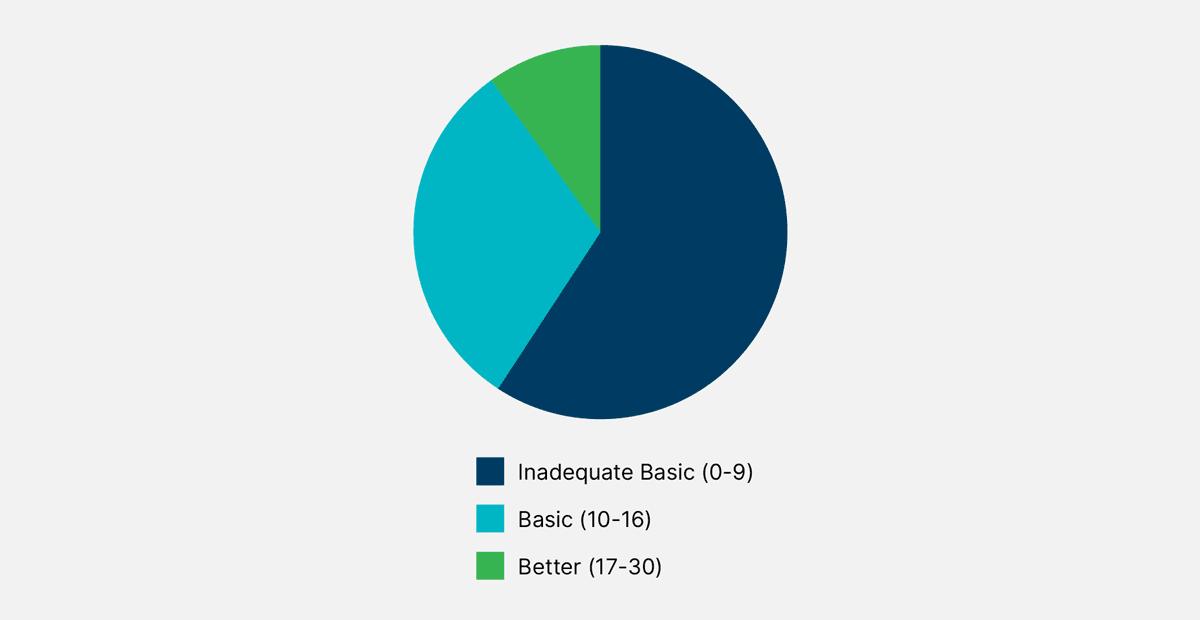
Some councils are demonstrating inspiring and commendable leadership
Some councils are doing commendably well, despite growing pressure on limited resources, and deserve recognition as leaders in their field. They are Brighton and Hove, Bristol, Cardiff, Central Bedfordshire, Cheshire West and Chester, Clackmannanshire, Devon, Dorset, Ealing, East Ayrshire, East Lothian, Glasgow, Greenwich, Middlesbrough, Monmouthshire, Somerset, Surrey, Telford and Wrekin, Tower Hamlets and the Vale of Glamorgan. We invited 14 of these councils to interview to provide information for a series of case studies. These case studies serve as good practice guidance for councils that are beginning their healthy and sustainable food journeys.
The councils in our case studies that are performing ‘better’ are from across the UK and span several political parties. There are a few noticeable patterns amongst leading councils:
- Over half (56 per cent) of councils included in our case studies are part of the Sustainable Food Places (SFP) network and run a local food partnership using SFP guidance. In our interviews, a handful of councils also shared that they work with food partnerships that are not part of the SFP network. Across the survey, councils with SFP food partnerships scored on average 11 per cent higher than councils without an SFP food partnership. It was clear from our interviews and analysis that councils that collaborate across the public, private and third sector and take a whole-system approach to food have enacted much more ambitious policies than those without a food partnership.
- Councils in this ‘better’ group are controlled by parties from across the political spectrum, indicating that planet-friendly food does not need to be a party-political issue.
- No councils in Northern Ireland scored well enough to achieve leadership status.
The picture varies across the four nations
- Scottish councils are leading the pack, but still only scored 39 per cent of available points.
- English Unitary councils scored 34 per cent of available points.
- English County councils scored 27 per cent of available points.
- Welsh councils scored 31 per cent of available points.
- Councils in London scored 30 per cent of available points.
Northern Ireland scored 11 per cent of available points.
Councils with SFP food partnerships vs. those without
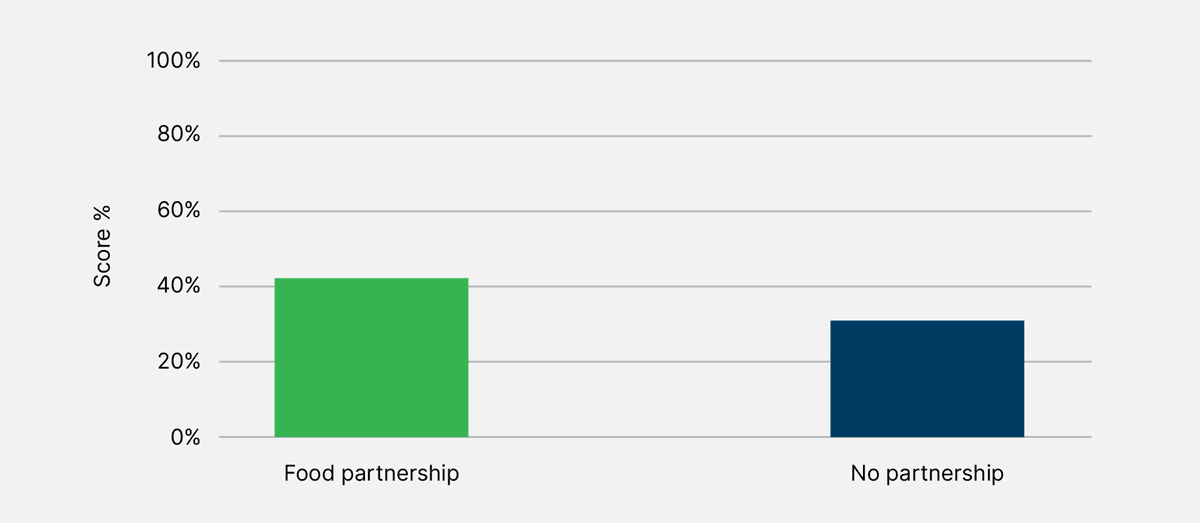
These findings highlight the important role of national policy in guiding local action on food. For example, on average, Scottish councils scored almost twice as many points in the Farming and Food Growing section of our report, partly as a result of the Community Empowerment Act 2015, which requires Scottish local authorities to prepare a food-growing strategy, identify allotment sies and extend the provision of community growing schemes.
Similarly, Welsh councils scored 57 per cent of available points across the Food Waste section of our report. The Welsh government has provided £23 million in funding to local authorities for food waste collections and awarded contracts to support Welsh anaerobic digestion facilities. These efforts are guided by statutory recycling targets to incentivise councils. Currently, Wales is aiming for a 70 per cent household recycling rate by 2025, and zero waste by 2050.[1]
Both Scotland and Wales are in the process of implementing national food strategies that will guide and support sustainable farming practices with the Scottish government in the process of adopting a Good Food Nation Act.[2][3] As other nations step forward on good food policy, the Westminster government has failed to implement recommendations of the independent National Food Strategy, including a Food Bill to bring forward the requirement to set up a food partnership in every local area. This difference in national policies between the four nations of the UK is a significant factor in the difference in performance between English authorities compared to Welsh and Scotting counterparts on food waste and food growing.
The relatively low score of Northern Ireland can partially be explained by the lack of a national executive at this time, as well as reduced powers of local authorities within Northern Ireland. Councils in Northern Ireland function differently to those around the UK. Many decisions that would typically be held by a local authority in the rest of the UK are reserved by central government, such as decisions on how procurement is carried out. Additionally, the absence of the executive in Northern Ireland has led to stasis in the national policy environment, hampering progress on climate change and many other issues.[4]
Distribution of 'inadequate', 'basic' and 'better' scores across themes
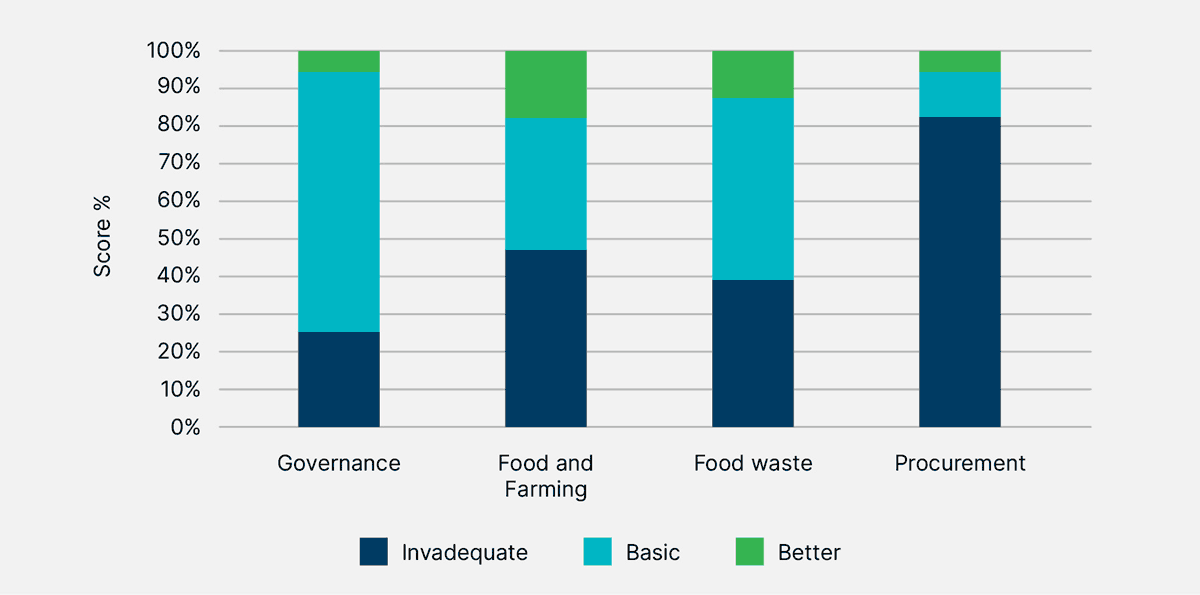
Governance
Councils in the UK scored 43 per cent of available points for Governance.
One quarter (25 per cent) of councils achieved an ‘inadequate’ score, which means that they have declared a climate emergency and might have an action plan to address it.
Over two thirds (69 per cent) of councils achieved a ‘basic’ score, which means they have some more developed governance in place on climate change, for example a timebound and measurable climate action plan in addition to declaring a climate emergency.
Just 6 per cent of councils achieved a ‘better’ score, which means that they are doing food-related governance work, such as having an active food partnership or signing up to the Glasgow Food and Climate Declaration.
From our ’better’ case studies: Councils reported that working in food partnerships was beneficial for understanding and taking full advantage of opportunities presented by work on food and farming, which can be complex but offers many co-benefits. Many councils reported that their good food journey began with the declaration of a climate emergency.
Regional distribution of scoring for governance
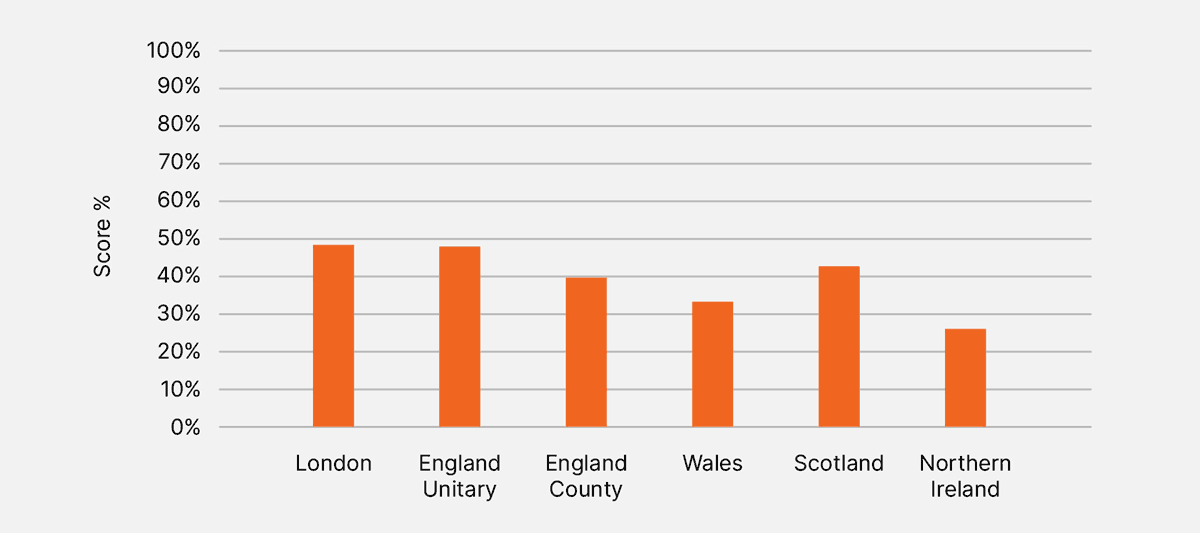
Farming and food growing
Scores overall were very low for farming and food growing. Councils in the UK scored just 19 per cent of the points available in this theme.
Across the UK, nearly half (47 per cent) of councils were awarded an ‘inadequate’ score, which means that no meaningful actions on Farming and Food Growing were found. When looking at Scotland, where councils performed better on Farming and Food Growing, only 16 per cent were identified as ‘inadequate’.
Just over a third (35 per cent) of councils achieved a ‘basic’ score, which means that they mention food growing, allotments, or local farming in their strategies. When looking at Scotland, that number grows to 44 per cent.
Just under a fifth (18 per cent) of councils achieved a ‘better’ score, which means that they have specific targets for food growing, allotments and local farming, with plans or aspirations to increase agroecological or sustainable farming practices in their area. When looking at Scotland, that number grows to 40 per cent.
Nearly all Scottish councils have some plans in place for food growing, with Scotland picking up 32 per cent of available points in Farming and Food Growing – almost double what was scored elsewhere. This is partly because the Community Empowerment Act 2015 requires Scottish local authorities to prepare a food-growing strategy, identify additional allotment sites and extend the provision of community growing schemes.
From our 'better’ case studies: Councils that scored particularly well on farming and food growing are taking into consideration both the economic and environmental benefits of making food production more sustainable. Councils recognise that localising the food economy can be good for jobs and local investment and are also weighing up the impacts that a changing climate will have on food security. Some of the councils that we spoke to mentioned that the 2022 heatwave signaled the disruption that they expect their economy and food system to suffer as a result of climate change and extreme weather events. As such, councils are exploring the ways that they can improve local food security by promoting sustainable and climate-resilient agricultural practices.
Regional distribution of scoring for farming and food growing
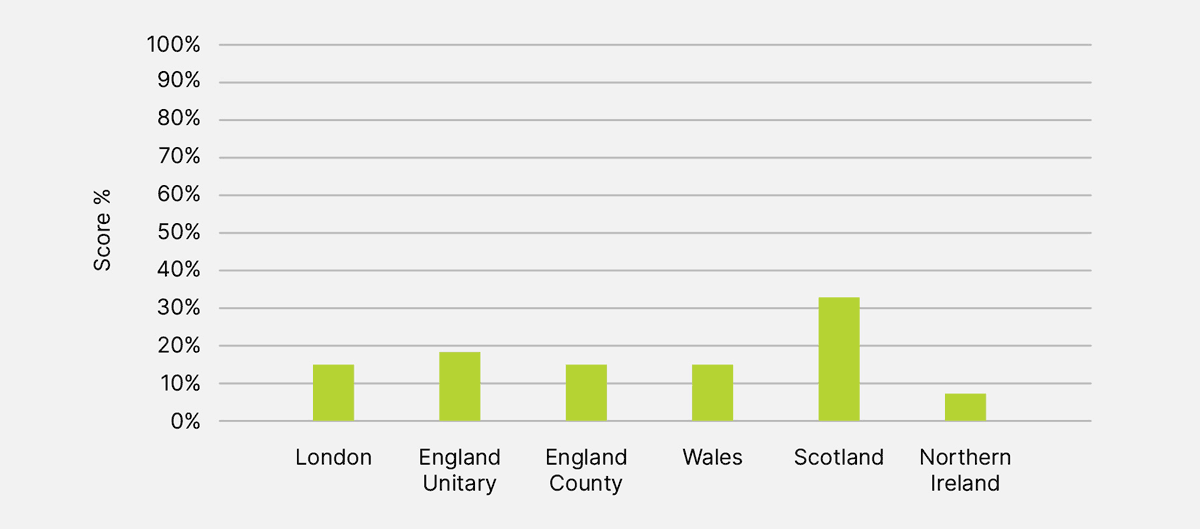
Food waste
Most UK councils have some policy in place for reducing local food waste. County councils are not responsible for handling food waste, so we have excluded their data from this section of the analysis.
Scores overall for food waste were relatively high compared with the other themes that we assessed. Councils scored 45 per cent of available points.
Just under a third (31 per cent) were awarded an ‘inadequate’ score, which means that they have some policy for reducing food waste, but that this is not timebound or measurable.
Just over half (55 per cent) were awarded a ‘basic’ score, which means that they have at least one policy which is timebound and/or measurable.
About one in seven (14 per cent) were awarded a ‘better’ score, which means that they are in the process of rolling out or have rolled out food waste collections and are also working to redistribute food surplus.
Wales and Scotland scored particularly highly across this theme, picking up 57 percent and 60 per cent of available scores respectively. This again reflects strong support at a national level. For example, the Welsh government’s ‘Towards Zero Waste’ strategy and Landfill Allowances Scheme (Wales) Regulations 2004 directly influence food waste management at the council level.
From our ‘better’ case studies: Councils are including food waste reduction in their food strategies because it reduces the cost of waste collection per tonne, provides a source of energy through anaerobic digestion and reduces greenhouse gas emissions. Councils that have successfully rolled out food waste collection have also done so by implementing a communications campaign to shift local culture around waste management.
Regional distribution of scoring for food waste
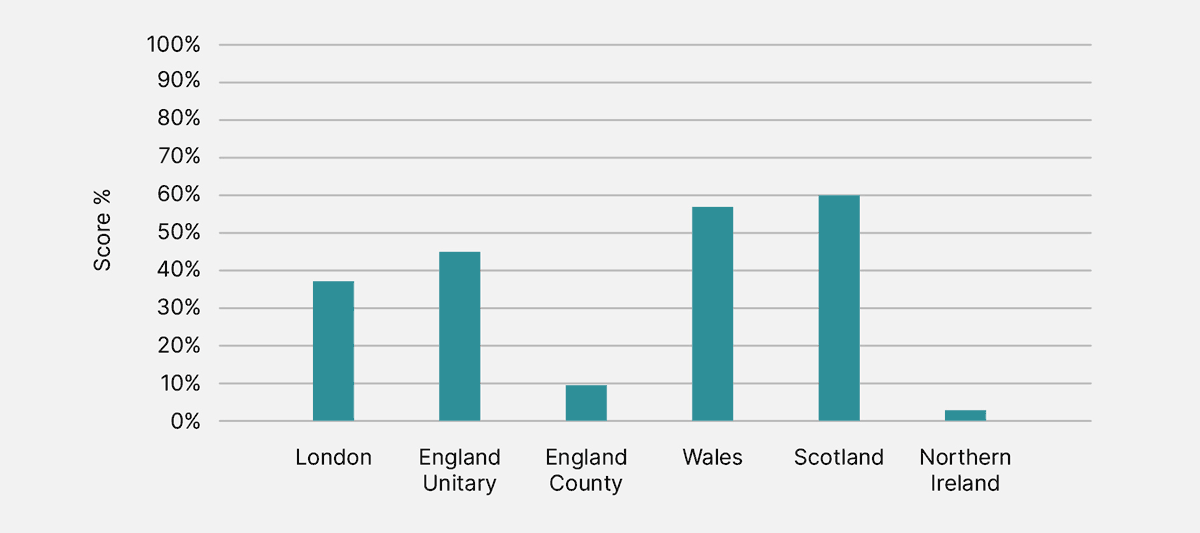
Procurement
109 councils had a policy in place to bring down emissions related to procurement, through purchasing arrangements and through engaging with their suppliers. However, food was specified as part of these procurement strategies in only 44 councils. This demonstrates a gap in councils' understanding between procurement being a powerful tool for reducing emissions, and the emissions-saving potential of changing local food procurement for council provided services.
Councils that include food in their procurement strategy vs. councils seeking to reduce emissions from procurement
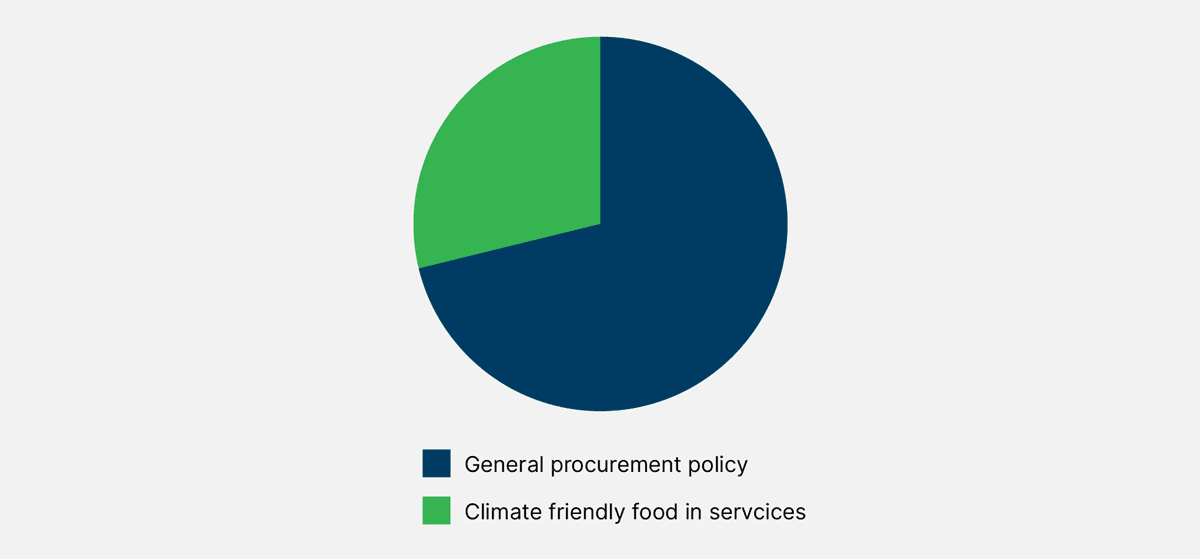
Given its vast potential for decarbonising food-related emissions, stimulating the local economy and creating better health outcomes, it is concerning that councils across the UK scored just one fifth (21 per cent) of available points on procurement.
Four fifths (83 per cent) of councils achieved an ‘inadequate’ score, which means they have no clear timebound or measurable policies to tackle the main source of food-related emissions for a council.
One in eight (12 per cent) of councils scored ‘basic’, which means that they have some timebound and measurable policies to tackle food-related procurement emissions or to engage with local residents on the topic of sustainable diets.
Just one in 20 (5 per cent) of councils scored ‘better’, which means that they are taking actions like serving fresh, locally sourced fruit and vegetables in schools, introducing low-meat or meat-free days, requiring contractors to have a sustainable food policy and encouraging local businesses to serve more climate-friendly food.
From the ‘better’ case studies, councils that have more advanced procurement strategies have recognised the economic, health and environmental benefits of serving more sustainable meals in services either run by the council, contracted by the council, or over which the council can have some influence. Some of these councils have realised these benefits too and have successfully used local procurement to develop a thriving local food economy and, in turn, improve local food security as well as health and climate outcomes. Some councils are exploring the co-benefits that adopting the principles of a good food policy (see Annex A) unlocks, both in terms of positive health outcomes and the reduction of food-related emissions.
Some of the councils also reported difficulties associated with changing their local procurement strategy. This is partly because of the complexities around changing a pre-existing catering contract, outsourcing local procurement to a region-wide organisation and procurement guidance for councils focusing on value-for-money, rather than a balance of economic and social value.
Regional distribution of scoring for procurement
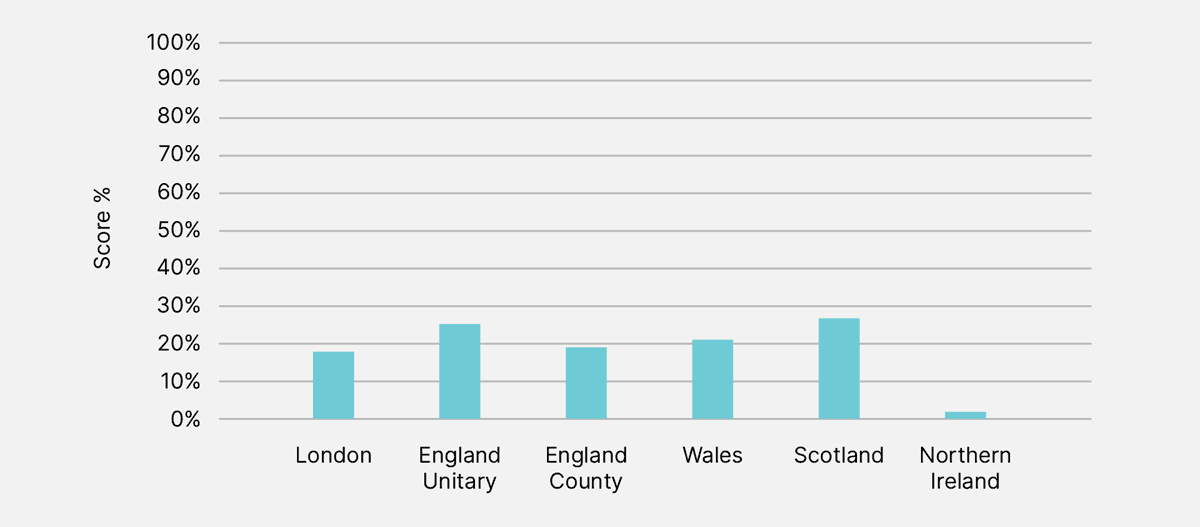
Map Summary Recommendations Why food Take action
[1] EfW Net (2020) Waste not, want not: What the world could learn from Wales’ food waste programme. Available online at:
https://network.efwconference.com/posts/waste-not-want-not-what-the-world-could-learn-from-wales-food-waste-programme [accessed 12/10/2022]
[2] Welsh Government (2021) Agriculture (Wales) White Pape. Available online at: https://gov.wales/sites/default/files/consultations/2020-12/agriculture-wales-bill-white-paper.pdf [accessed 12/10/2022]
[3] Scottish Government (2022) Good Food Nation (Scotland) Act 2022. Available online at: https://www.legislation.gov.uk/asp/2022/5 [accessed 12/10/22]
[4] Institute for Government (2019) Summary: Governing without ministers. Available online at: https://www.instituteforgovernment.org.uk/summary-governing-without-ministers-northern-ireland [accessed 12/10/2022]








